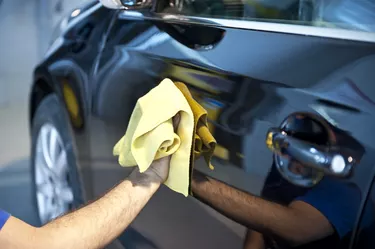
There's a lot to deal with when a loved one passes away. If there's a car involved, the process can be simple or complex based on various factors. Some issues that determine how the car is inherited include the vehicle's title, the will, the state's probate laws and any liens on the car.
Check for Joint Ownership
Video of the Day
When there are two names on car title and one dies, the first thing to check is whether the car has joint ownership. If the car titled is held as joint tenants with right of survivorship, ownership automatically transfers to the surviving owner.
Video of the Day
In some states, no special wording is required on the title. For example, if a title lists two names, the surviving owner takes full ownership under that scenario. However, other states require the title to specifically contain the words "joint tenants with right of survivorship" to ensure the property transfers.
Even if you're a joint owner assuming full ownership, you'll still need to provide the vehicle registration office a copy of the death certificate and complete a new title request.
Bypassing Probate
A last will and testament specifies the decedent's wishes, but it doesn't automatically keep the estate out of probate.
In certain states, the designated beneficiary can take ownership of the vehicle without having to go through probate. The new owner would need to complete and file an affidavit confirming a series of questions about the vehicle and right to claim ownership. The affidavit – along with other documents, such as the death certificate – must be recorded at the motor vehicle department or registration office.The new owner would need to pay all associated fees, including title and registration fees.
While some states automatically allow a vehicle transfer after the death of an owner to the beneficiary if there's a will, other states only will allow it if the rest of the estate is exempt from probate. If you aren't sure about your state's procedures, contact the state motor vehicle agency.
Probating the Vehicle
If there's no will, or the vehicle wasn't listed in the will, the vehicle may need to be probated. In that scenario, the state will determine who is entitled to the vehicle based on the intestate succession. Generally, the surviving spouse is first in line, followed by any children. Since probate is the process of settling debts and distributing leftover assets to beneficiaries, any debts would have to be paid first.
If the car is owned free and clear, it could be sold if the debts exceed the assets. If the other assets are enough to cover the debts without liquidating assets, the vehicle will pass to whoever the court determines in the order of summary administration. The beneficiary takes a copy of the summary administration to the vehicle registration department to transfer ownership.
Where There is an Auto Loan
If there's a loan against the vehicle, it's considered a secured debt and the lender could repossess the car if the payments aren't made. Communicate with the lender about the death and provide verification, if requested. The person who inherits the car becomes responsible for making the payments, but the lender may require you to refinance the loan into your own name rather than allow you to assume the payments.
Unfortunately, you won't be able to refinance the loan until you're the legal owner. A joint owner listed on the title and car loan, must continue making the payments and can have the decedent's name removed from the loan and title by submitting a death certificate.